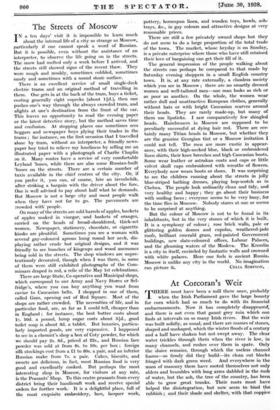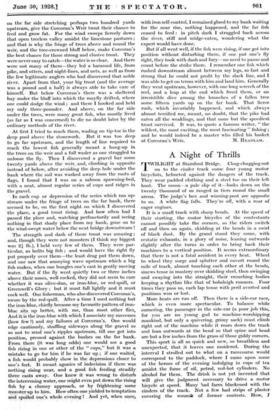At Corcoran's Weir
THERE must have been a mill there once, probably when the Irish Parliament gave the large bounty for corn which had so much to do with -its financial embarrassments. Now it has completely disappeared; and there is not even that gaunt grey ruin which one finds at intervals on so many Irish rivers. But the weir was built solidly, as usual,• and there are masses of stones, shaped and unshaped, which the winter floods of a century and a half have shaken but not swept away. The clear water trickles through them when the river is low, in many channels, and rushes over them in spate. Only the sluice remains, through which the useless channel foams—so firmly "did they build—its clean cut blocks fringed with dark green weed. And everywhere in the mass of masonry there have rooted themselves not only alders and brambles "with- long- arms dabbled in the rush of water, but the ash, the tree of the country, has been able to grow great trunks. Their roots must have helped the disintegration, but now seem to bind the rubbish ;: and their shade and shelter, with that coppice on the far side stretching perhaps two hundred yards upstream, give the Corcoran's Weir trout their chance to feed and grow fat. For the wind sweeps fiercely down that open treeleis valley amidst the limestone pastures ; and that is why the fringe of trees above and round the weir, and the tree-crowned bluff below, make Corcoran's the best chance for those strong and elusive trout. They were never easy to catch—the water is so clear. And there were not many of them—they led a harassed life, from pike, and otters, and night-lines, and nets, as well as from the few legitimate anglers who had discovered that noble river. Apart from that, your big trout (and the average was a .pound and a half) is always able to take care of himself. But- below Corcoran's there was a sheltered bay under the bluff into which the mayfly drifted, where one could dodge the wind ; and there I hooked and held my only three-pounder. And above, on the far side under the trees, were many great fish, who mostly lived (as far as I was concerned) to die no doubt later by the ordinary methods of the river. At first I tried to reach them, wading on tip-toe in the deep pool above the stonework. But it was too deep to go far upstream, and the length of line required to reach the lowest fish generally meant a hang-up in the trees on the weir and a full wader as one struggled to unloose the fly. Then I discovered a gravel bar some twenty yards above the weir, and, climbing in opposite instead of below, after avoiding the deep hole under the bank where the soil was washed away from the roots of flags, I found that I was on a salmon spawning-bed, with a neat, almost regular series of cups and ridges in the gravel. '• In each cup or depression of the series which ran up- stream under the fringe of trees on the far bank, there seemed to be, on the first night on which I discovered the place, a good trout rising. And how often had I passed the place and, watching perfunctorily and seeing nothing in that shady place from my bank, gone on to the wind-swept water below the next bridge downstream ! The strength and dash of those trout was amazing ; and, though they were not monsters (I think my biggest was 21 lb.), I held very few of them. They were par- ticular, as befits big fish ; and would have the right fly put properly over them—the least drag put them down, and one saw that annoying wave upstream which a big fish makes, when one bungles one's cast in gently moving water. But if the fly went quietly two or three inches above their noses, well cocked, they did not seem to care whether it was olive-dun, or iron-blue, or red-quill, or Greenwell's Glory ; but it must fall lightly and it must cock well. One fisherman, who also discovered Corcoran's, swore by the red-quill. After a time I used nothing but the iron-blue, chiefly because my favourite pattern of iron- blue sits up better, with me, than most other flies. And it is the iron-blue with which I associate my successes. (how few !) and my failures at Corcoran's. One would edge cautiously, shuffling sideways along the gravel so as not to send one's ripples upstream, till one got into position, pressed against the bushes on the far bank.. From there (it was long odds) one would see a good. Ash rising in one or other of the " cups," but it was a mistake to go for him if he was far up ; if one waited, a fish would probably show in the depressions closer to one's feet. It meant agonies of indecision if there was nothing rising near, and a good fish feeding steadily three casts away. One knew it was wrong to disturb the intervening water, one might even put down the rising fish by a clumsy approach, or by frightening some monster up to him. flow often one yielded to temptation and spoiled one's whole evening.! And yet, when once, with iron self-control, I remained glued to my bank waiting for the near rise, nothing happened, and the far fish ceased to feed : in .pitch dark I struggled back across the river, stiff and midge-eaten, wondering what the expert would have done. But if all went well, if the fish were rising, if one got into position without disturbing them, if one put one's fly right, they took with dash and fury—no need to pause and count before the strike there. I remember one fish which rushed downstream almost between my legs, so fast and strong that he could not profit by the slack line, and I was able to get on terms with him and land him. Generally they went upstream, however, with one long screech of the reel, and a leap at the end which freed them, or an irresistible dive among the branches of a fallen tree some fifteen yards up on the far bank. That fierce rush, which invariably happened, and which always almost terrified me, meant, no doubt, that the pike had eaten all the weaklings, and that none but the speediest trout survived. It was, to quote a famous writer, " the wildest, the most exciting, the most fascinating " fishing ; and he would indeed be a master who filled his basket









































 Previous page
Previous page